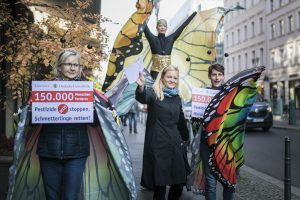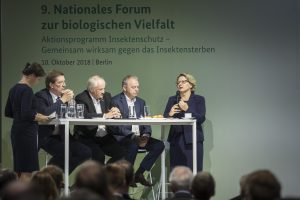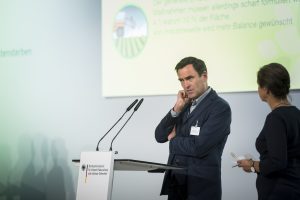In this post, Carsten Brühl provides some background on a new program for insect conservation by the German Federal Ministry for the Environment, Nature Conservation and Nuclear Safety (BMU), where he chaired a workshop on pesticide reduction.

Demonstrations for insects before the start of the meeting “Forum on Biodiversity” (photo by BMU/Florian Gaertner)
The decline in insects was described in a compelling long-term study in Germany, where a reduction of almost 80% biomass was observed in the last 27 years for flying insects in conservation areas in the agricultural landscape. This finding was not unique, since other studies in the last decade also showed declines in insect populations in different species groups. However, insect biomass indicates not only a very likely decline in ecosystem services such as pollination or pest control but also potentially affects higher trophic levels in food webs and groups such as birds, amphibians, reptiles and mammals.

Minister Svenja Schulze discussing the action program with stakeholders from NGOs (NABU), communities and the farmers’ association (photo by BMU/Florian Gaertner)
Politics in Germany reacted to these findings. At the Forum on Biodiversity of the Federal Ministry for the Environment, Nature Conservation and Nuclear Safety (BMU) a list of measures to counteract this development was presented in early October. It was recognized that insects not only represent a fundamental part of biodiversity but that they are vital for humans, because of the ecosystem services they provide. The proposed measures in the “action program for insect conservation” include among others the increase and protection of insect habitats in the agricultural landscape as well as reduction in inputs of fertilizers and pesticides that affect insects negatively. The program is ambitious and covers many different measures that will not only be beneficial for insects but also other organism groups.
Agriculture, covering almost 50% of Germany’s land area, and its effect on insects were identified as a top priority for action. Here the reduction of insects was most obvious, and due to the large land area, agriculture will be the key component to address the observed decline of insects. In agricultural cropping systems, pesticides are recognized as components that have negative effects on insects and therefore this group of chemicals is mentioned in different parts of the action program.
In the specific pesticide reduction section, suggested measures include an application stop of pesticides and biocides in nature conservation areas, buffer strips of 10-20 m to surface water bodies, drift reduction during pesticide application and a reduction of systemic seed treatments. Additionally, the program calls for an almost complete stop of glyphosate use and a general reduction of risks from pesticides. Germany will also end pesticide use on federal properties and will support pesticide-free towns and municipalities.

Carsten Brühl presenting results from the pesticide reduction workshop (photo by BMU/Florian Gaertner)
These suggested measures were discussed in stakeholder workshops, and I chaired the one on pesticides. In the one-hour workshop, almost 40 participants had interesting and sometimes heated discussions over contributions from NGOs, the pesticide industry, authorities and farmers’ representatives. Some lacking actions were identified, such as buffer zones to terrestrial structures but also the inclusion of application series to reflect reality in the regulation of pesticides.
You can bring in own ideas on the suggested catalogue of measures in an online dialogue with the BMU that is open until November 7th, 2018. Take the chance! This program and the current political willingness for change has the potential to bring back more biodiversity into Germany’s agricultural landscape.
